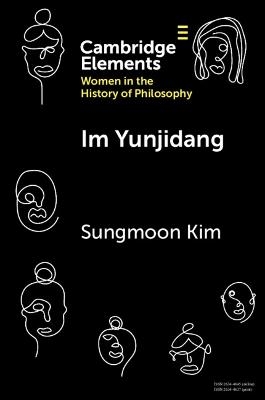
Im Yunjidang
Seiten
2022
Cambridge University Press (Verlag)
978-1-009-01066-5 (ISBN)
Cambridge University Press (Verlag)
978-1-009-01066-5 (ISBN)
This Element aims to critically examine the philosophical thought of Im Yunjidang 任允摯堂 (1721-93), a female Korean Neo–Confucian philosopher from the Chosŏn 朝鮮 dynasty (1392–1910), and to present her as a feminist thinker.
This Element aims to critically examine the philosophical thought of Im Yunjidang 任允摯堂 (1721–93), a female Korean Neo-Confucian philosopher from the Chosŏn 朝鮮 dynasty (1392–1910), and to present her as a feminist thinker. Unlike most Korean women of her time, Yunjidang had the exceptional opportunity to be introduced to a major philosophical debate among Korean Neo-Confucians, which was focused on two core questions-whether sages and commoners share the same heart-mind, and whether the natures of human beings and animals are identical. In the course of engaging in this debate, she was able to reformulate Neo-Confucian metaphysics and ethics of moral self-cultivation, culminating in her bold ideas of the moral equality between men and women and the possibility of female sagehood. By proposing a 'stage-approach' to feminism that is also sensitive to the cultural context, this Element shows that Yunjidang's philosophical thought could be best captured in terms of Confucian feminism.
This Element aims to critically examine the philosophical thought of Im Yunjidang 任允摯堂 (1721–93), a female Korean Neo-Confucian philosopher from the Chosŏn 朝鮮 dynasty (1392–1910), and to present her as a feminist thinker. Unlike most Korean women of her time, Yunjidang had the exceptional opportunity to be introduced to a major philosophical debate among Korean Neo-Confucians, which was focused on two core questions-whether sages and commoners share the same heart-mind, and whether the natures of human beings and animals are identical. In the course of engaging in this debate, she was able to reformulate Neo-Confucian metaphysics and ethics of moral self-cultivation, culminating in her bold ideas of the moral equality between men and women and the possibility of female sagehood. By proposing a 'stage-approach' to feminism that is also sensitive to the cultural context, this Element shows that Yunjidang's philosophical thought could be best captured in terms of Confucian feminism.
Introduction; 1. Yunjidang: The Person and Her World; 2. Im Yunjidang's Neo-Confucian Philosophy; 3. Im Yunjidang and Confucian Feminism; Conclusion.
| Erscheinungsdatum | 02.08.2022 |
|---|---|
| Reihe/Serie | Elements on Women in the History of Philosophy |
| Zusatzinfo | Worked examples or Exercises |
| Verlagsort | Cambridge |
| Sprache | englisch |
| Maße | 152 x 228 mm |
| Gewicht | 130 g |
| Themenwelt | Geisteswissenschaften ► Philosophie ► Geschichte der Philosophie |
| Geisteswissenschaften ► Philosophie ► Philosophie der Neuzeit | |
| Sozialwissenschaften ► Politik / Verwaltung ► Politische Theorie | |
| Sozialwissenschaften ► Soziologie | |
| ISBN-10 | 1-009-01066-2 / 1009010662 |
| ISBN-13 | 978-1-009-01066-5 / 9781009010665 |
| Zustand | Neuware |
| Informationen gemäß Produktsicherheitsverordnung (GPSR) | |
| Haben Sie eine Frage zum Produkt? |
Mehr entdecken
aus dem Bereich
aus dem Bereich
eine Geschichte der Zuversicht von Homer bis zum Klimawandel
Buch | Hardcover (2024)
C.H.Beck (Verlag)
CHF 39,20
die kolonialen Wurzeln der französischen Theorie
Buch | Hardcover (2024)
Matthes & Seitz Berlin (Verlag)
CHF 41,90


